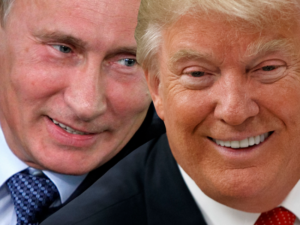It seems like yesterday. Mitt Romney, the 2012 Republican nominee for president of the United States, said Russia had emerged as the most dangerous “global geopolitical threat” to the United States.
Many of us scoffed at that notion. It seemed so, oh, Cold War-ish. I mean, c’mon, Mitt! We won the Cold War. The Soviet Union vanished in 1991. Democracy was returning, albeit in dribs and drabs, to a new Russia. Isn’t that what many of us said and/or thought?
Well, it turns out Mitt was right. His critics were wrong. Russia has sought to do a lot of harm to the world and, quite possibly, to the U.S. electoral process.
But wait! This new Republican Party is being led by someone with an entirely different view of the Big Bear. Donald J. Trump is about to become president. He is forming his government. He is building his Cabinet.
Who is the new president apparently about to select as the nation’s secretary of state, its top diplomat, its foreign policy vicar? It appears to be a fellow named Rex Tillerson, head of Exxon Mobil — and a close ally of the nation Mitt ID’d as America’s top threat.
Exxon Mobil has extensive business ties in Russia. Tillerson is said to be friends with Putin.
For that matter, let’s recall that Trump has said some flattering things about the man who once ran the Soviet Union’s spy agency, the hated KGB. He called him a “strong leader”; he accepted Putin’s praise with gratitude; he invited Russia to find some missing e-mails that Hillary Clinton had deleted from her personal server while she was working as secretary of state; he suggested that Russian forces should enter Syria and take on the Islamic State; he said “wouldn’t it be great?” if we got along better with Russia.
You’ve heard the term “identity politics,” yes? It’s meant to pigeonhole certain groups and political affiliations into categories. Democrats once were identified as the party that was “soft on communism” and, thus, soft on the Soviet Union. Republicans were identified as the opposite of that squishy label.
Communism officially has died in Russia. What has emerged in its place, though, appears to be its oppressive equal.
Democrats now are alarmed at the budding U.S.-Russia coziness. Republicans — with a few notable exceptions — seem somewhat OK with it.
U.S. Sen. John McCain, the 2008 GOP presidential nominee and one-time Vietnam War prisoner, has expressed “concern” about Tillerson’s relationship with Putin. You would expect McCain to raise those questions; he dislikes the president-elect and he damn sure detests the Russians, given what their former agents — the North Vietnamese — did to him for more than five years in that POW cell in Hanoi.
Frankly, I am beginning to long for the good old days that, in the grand scheme, were just a little while ago.
I also am thinking the reason Mitt likely won’t get the State job has less to do with what he said about Trump — the “fraud” and “phony” stuff — and more to do with what he said about the Russians.
